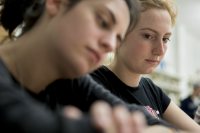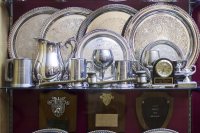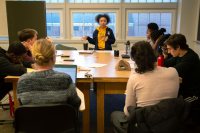
Smith ’13 and Djang ’13 join the ‘elite of elite’ world debaters
This past New Year’s Eve, Bates debaters Catherine Djang ’13 and Ben Smith ’13 were listening to a countdown of a different sort.
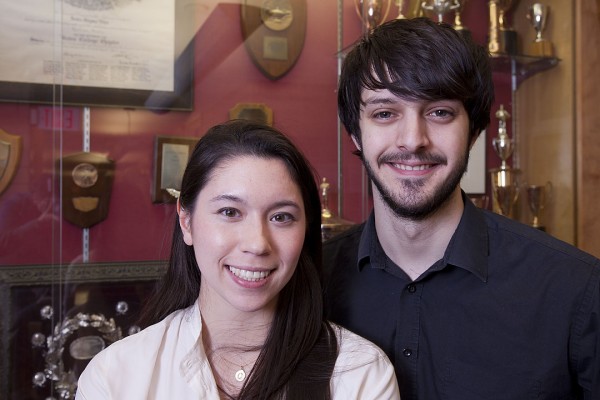
Catherine Djang ’13 and Ben Smith ’13 are the first Bates debaters to “break” at the World Universities Debating Championship since 1999. Photograph by Phyllis Graber Jensen/Bates College.
They were in Berlin, in a big meeting room at Technische Universität along with 384 of the world’s best debate teams.
After nine grueling preliminary debates over the prior three days, the debaters were listening to the slow roll call of teams that had earned enough points to “break” into the 48-team elimination rounds of the World Universities Debating Championship, held Dec. 27 through Jan. 4.
Forty-four teams had already been announced.
Just four spots remained.
No Bates team had advanced since 1999.
Then came the sweet words from the front of the room: “Breaking 45th, on 18 points: Bates A.”
A few minutes later, Djang was shaking, mostly because a fellow Bates debater had just grabbed her shoulders. “Do you know what this means!?” exclaimed Taylor Blackburn ’15.
“Do you know what this means for Bates!?” continued Blackburn. “Do you know what this means for you!?”
What “this” means is this: Djang and Smith are now “among the elite of elite of global debaters,” says Director of Debate and Lecturer in Rhetoric Jan Hovden, who served as a judge in Berlin, as did Blackburn. (Adding to the Bates presence at this year’s WUDC was Colin Etnire ’12, who was selected as one of nine judges of the Grand Final, won by Monash University.)
Breaking at the WUDC is one of those feats that’s more impressive the more you learn about it. For one thing, they are the first Bates team to break since Tamara Pogue Drangstveit ’99 and Amy Keith ’99 did the trick their senior year.
“Not many people realize how big an achievement this really is,” says Drangstveit, who now directs the Family & Intercultural Resource Center in Summit County, Colo. “The tournament is really the Olympics of international spoken and analytic competition.”
The numbers support what she says.
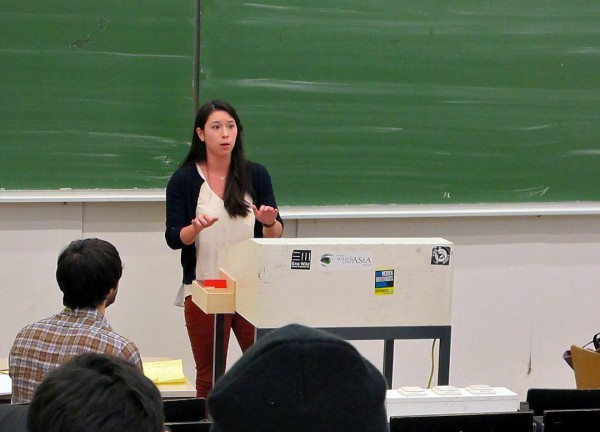
Djang advances her team’s argument during a World Universities Debating Championship match as teammate Ben Smith ’13 watches.
This year, those 384 teams came from 264 colleges, universities and debating societies in 64 countries, from Afghanistan to Zimbabwe. Once featuring mostly teams from England and Australia, WUDC is now more worldwide and competitive than ever, and this year’s field was about double that of a decade ago.
“You can be in a room with people representing every continent except Antarctica,” says Hovden.
Djang and Smith’s feat gains even more luster when you learn that Americans have no edge in international debating (Bates’ long history of international debate notwithstanding). A handful of English and Australian colleges dominate: “Oxford and Cambridge, Sydney and Monash,” recites Hovden.
International debaters tend to be vastly more experienced, nearly professional. As Smith says wryly, “We’re not as good.” International debaters are often law students or Ph.D. candidates. “It can be intimidating.”
Even at home, Bates debate walks a distinctive path, as most other colleges have tryouts and cuts; Bates never has.
Of the 33 U.S. colleges and universities that sent 53 teams to Berlin, only nine teams made the break: Bates, Stanford, Harvard, Yale and Princeton. Not making the cut were U.S. teams from Brown, Columbia, Cornell, Duke, Swarthmore, Amherst, and Williams, among others.
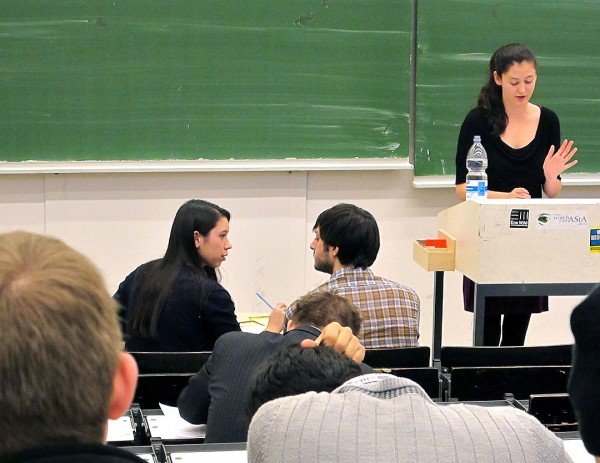
Djang and Smith confer as a McGill University debater presents the Opposition argument during a preliminary round of the 2013 World Universities Debates Championship. Bates argued the Government position with Australia’s Griffith University, while McGill was paired with Durham Union Society of England.
Americans are also at a disadvantage at the WUDC because U.S. parliamentary style differs from the British style employed at most world tournaments.
American style features one team (the Government) supporting the motion, and the other team (the Opposition) against. British parliamentary style doubles the fun. Two teams are on each side of the motion, each team getting a chance to support or oppose the motion.
For example, in one of their debates, Smith and Djang, along with a team from Australia’s Griffith University, were the Government, supporting the motion that “universities should never prohibit research or teaching on the grounds of sexist, racist or otherwise discriminatory implications.” The Opposition teams were from Canada’s McGill University and Durham Union Society of England.
“The British style is a lot more competitive,” Smith says. “It’s more exciting, and there’s a lot more strategy.”
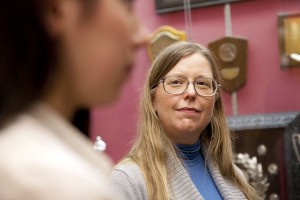
Breaking at worlds puts Djang and Smith “among the elite of elite of global students,” says Director of Debate and Lecturer in Rhetoric Jan Hovden. Photograph by Phyllis Graber Jensen.
Hovden explains that the two styles reflect “different argumentative communities.” That is, “the way you might argue in a court of criminal law is different from civil law. How you are argue with the person on the street differs from how you argue” in the academic realm.
Given the complexity of the format, it’s imperative for a team to keep track of all arguments, then wisely choose which ones to argue. You simply can’t argue them all.
“You have to identify the really critical arguments of the debate and use them to your advantage,” Smith says.
This ability, taught to Smith and Djang by their coach, Jan Hovden, is also what debate alumnus Erich Fuchs ’92 learned from the late Bob Branham, the coach who completed the Bates program’s shift from policy debate to the more freewheeling parliamentary style by 1990.
Fuchs, now on the faculty in the Department of Communication Arts and Sciences at Penn State, recalls how Branham would “caution against simply refuting each argument separately” during a parliamentary debate, even as he taught his debaters to track the many different arguments carefully.
Branham “recommended developing perspective on the entire debate, then developing a few carefully selected responses or incisive points of information,” Fuchs says.
“Points of information” are occasions when a side can question the other. “Because there can be several people asking you questions, you can get bombarded,” Smith said. “But it’s more fun that way.”
All told, being an underdog at a world-level event suited the Bates team just fine. Like any competitor who relishes the arena, Djang and Smith savored the chance to “play up.”
“There’s greater pressure to perform, but we like that,” Djang said. “The different knowledge backgrounds, different educational backgrounds — it’s exciting on so many levels.”
In at least one instance, the Bates team used its academic coursework for effect.
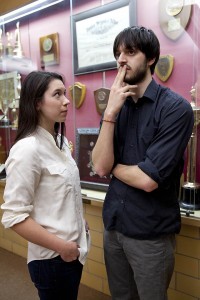
Catherine Djang ’13 and Ben Smith ’13 ponder a question as they pose for photographs near the debate trophy case in Pettigrew Hall. Photo by Phyllis Graber Jensen/Bates College.
In the fifth preliminary round, Djang and Smith argued the Government side on the motion that progressive males “of dominant ethnicities” should refrain from taking jobs when there is a qualified candidate from a “historically disadvantaged group.”
A politics major (with minors in philosophy and Spanish) whose senior thesis looks at the underrepresentation of women in politics, Djang, who goes by “Cat,” pounced.
“I was able to easily articulate a justification for why it is important to consider historical marginalization and access to positions of power,” she said.
Of course, a debate motion can just as easily clash with a debater’s set of beliefs. (Case in point: Smith, being a self-described progressive male, had less zeal for the motion.)
Specific motions aside, the overall experience at an event like the WUDC, where debaters might argue more than a dozen motions over a few days — on sensitive topics ranging from nuclear weapons and aid to Egypt to feminism, monogamy, religious intolerance and population control — is enough to jostle anyone’s beliefs.
“You go into a debate and you realize that your strongly held opinions are matched by strong opinions on the other side, with very valid arguments to support them,” Smith acknowledges. “You can lose track of what you yourself believe.”
But, says Hovden, offering her students a path out of this rhetorical rabbit hole, by arguing a position that you don’t believe, “students to gain a better understanding of the issue as a whole.”
In turn, understanding an issue is the first step toward testing one’s own beliefs, a basic tenet of a liberal arts education. From that test comes greater respect for the positions of others.
“Ultimately,” Hovden says, completing her own neat argument, “that makes the student a stronger and more empathetic individual.”
